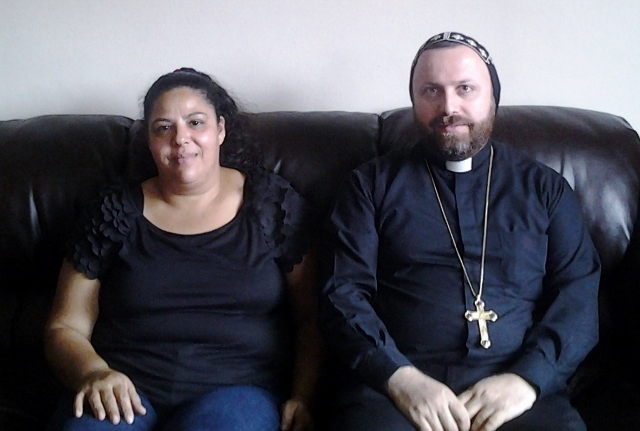
To Roanoke residents Father Andrew Bahhi and Ayeda Sati, Syria is much more than just a place in the headlines. For much of their lives, it was home, and to many members of their family it still is.
As a priest with the Syriac Orthodox Church, Bahhi moved to Roanoke last year to lead the St. Philoxenus Church in Cloverdale after spending five years in Egypt. Sati, a parishioner of the church, has lived in the area since 2001 when she immigrated to be closer to her parents. “[Syria] was a good home,” says Sati, who thinks back on the thirty years she spent in the Homs area with tears in her eyes. “In Homs, my church and their mosque were next door to each other and we never had any problems. They went to their mosque and I went to my church.”
But that was before the Arab Spring began in 2011 and the civil war shortly afterward. Now, sizable parts of Homs lie in ruins and thousands have been killed in the fighting between forces loyal to President Bashar al-Assad and a group of rebels who would like to see him removed from power, a goal of which both Father Bahhi and Sati question the motivations. “I do not call them rebels,” says Father Bahhi, of those opposing Assad. “I call them terrorists. If Assad goes, everything will change.”
Having visited her family in Syria in 2005 and 2010, Sati adds; “Before 2011 we used to live normally. I could always walk around without having to cover myself from head-to-ankle, but not now.”
Those fighting the Assad government have labeled themselves the Free Syrian Army, but Bahhi says the inner-workings are far more complicated and that, at present, he is aware of over 1400 organizational names involved in the rebellion. Many are radical Islamists from countries such as Saudi Arabia, Qatar and Chechnya. “Two bishops [in Aleppo], one a Greek and one a Syriac, were kidnapped in April by Chechens,” he says. “The two priests who went to negotiate their release were also kidnapped. They kidnap for money and to scare. We are very afraid for our people.”
To the Christian minority in Syria, Assad has been an ally and both Bahhi and Sati are fearful of what will happen when, and if, he is gone. “The Muslims keep killing the Christians,” says Father Bahhi, “so we are sensitive. When Assad supported us, we loved him. He celebrated Easter with us. He was the first one to ever do that. He came to us.”
These days, for Bahhi and Sati, the news features troubling images of running gun battles, advancing armies and crushed neighborhoods. Contact from home is frequently interrupted because of the volatile situation on the ground, but both try to communicate daily with their loved ones, wondering anxiously during extended times when telephone service and electricity have been unavailable. From his family home in Al Hasakah, in the northwest of Syria, Father Bahhi’s brother recently told him that day-to-day living has become extremely expensive because of the difficulty in transferring goods.
About the possibility of American intervention, Father Bahhi says; “If America hits Syria, Russia will hit America in Syria. Russia will not lose anything. America will not lose anything. But Syria will lose everything. We will pay the bill from our people and our land.”
“This could start World War III,” adds Sati.
Whether Bashar al-Assad has any real love for the Christian minority in his country or if his support of them has been a calculated move to appease western countries and keep them neutral to his government is unknown, but graphic videos of radicals fighting for the Free Syrian Army have surfaced and feature grisly images of decapitation, disembowelment, and the eating of human organs. These videos run contrary to the idea of rebels fighting for freedom from a tyrannical regime and call into question the idea that Syria will continue to be a stable, inclusive and peaceful country should they win and Bashar al-Assad lose.
“We pray for God to bring peace for Syria,” says Father Bahhi, “and we ask God to lead the leaders to bring peace. We love America, but we do not want terrorists to have weapons. Tomorrow they will turn [those weapons] on you.”
– Ian Graham

